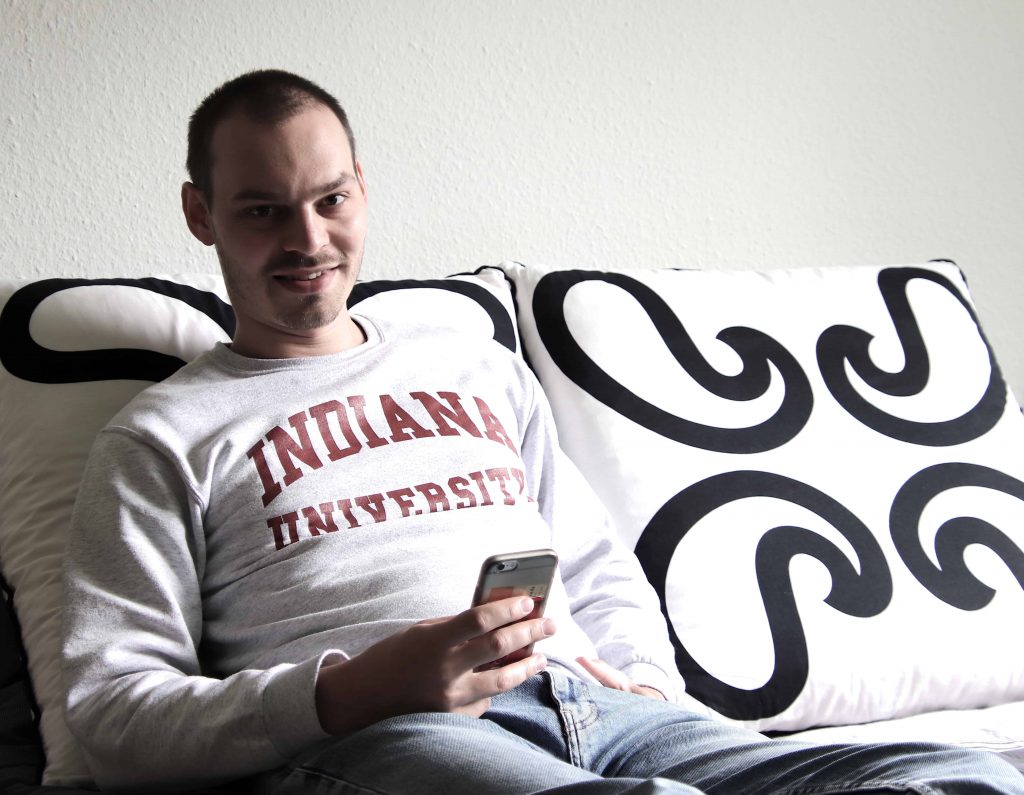2. Arrival
The big cities in Germany are already expensive. Especially when you want a free space close to the center. friends-abroad helps you to find a cheap flat in Hamburg and a lot more that you will need when you are in Germany.
How to find a cheap flat in Hamburg and more
We support you to get your working permit/permission and to live in Germany. Check out, how to apply for a working permit and how to find a flat. We will show you how to receive a social insurance number, a health insurance and an official address. Therefore you will net to find a flat first.
But don’t worry! We offer a huge variety of services to help you out with every single detail of living in Germany. Check out our packages!
Please consider that the information below focuses on the situation in Germany. In other European countries the regulations are very similar. Countries outside of the EU might have different regulations.
Renting a car is rather easy, but quite expensive.
The most common platforms are
- billiger-mietwagen.de
- mietwagen.check24.de
- mietwagen-check.de
Make sure to bring your driver’s license and passport.
We are answering your questions, help you to find the best solution to move around and even accompany you to the rental station. Contact us and get more infos.
As it is nearly impossible to rent a flat without being there personally, there are only two options left:
- Family and Friends
- Hotels and Hostels
We are recommending booking.com, HRS and Expedia. But also hostelworld.com could be an option.
If you are not planning to rent a car, it is better to chose an accommodation which is close to a U-Bahn, Straßenbahn, S-Bahn or at least a bus stop. Depending on the size of the city, there might be no U-Bahn, Straßenbahn or S-Bahn.
We provide personal help to quickly find your new flat. Check out our packages or contact us!
We help you to receive a German phone number. This will not only reduce your costs when calling German or European numbers but it is also a must when it comes to official documents, applications and other situations where you are asked for you mobile phone connection.
Friends-abroad helps you to find a cheap mobile phone contract which fits perfectly to your wishes.
By the way: if you are coming from EU country, remember that you also have to switch to a German phone number. Even if you can call German numbers for free due to EU regulations, people you stay in Germany permanently have to switch to a German mobile phone provider.
When you are landing here, you probably already found out that a cheap flat in Hamburg, Munich or Stuttgart is nearly impossible to get. And if it is there, it is often spam. You increase your chances to find a flat if you are able to provide the following:
- The Aufenthaltserlaubnis or your current visa
- Your working contract
- If available, a confirmation from your last landlord that you always paid your rent on time (Wohnungsgeberbestätigung)
- Very often, landlords or real estate agents are also asking for a SCHUFA Auskunft (read the next bullet point if you want to know more about it
- Sometimes you are also asked for copies of your ID card or passport or a CV
Make sure, to leave a good first impression (be punctual, take care about your clothes, smile,…)
The most common platforms in Germany to find a flat are
We are experienced with finding flats. Let us know how we can help you. Just fill out the field below or contact us!
This is our number 1 tip to find a cheap flat in Hamburg and in other German cities: In some cases, you have the possibility to get one of the WBS flats. Those are flats, which are reserved for people with a low income. Therefore you need to fill out a form and apply for the permission to rent one the flats. You have to renew your WBS permission in regular time periods. Of course we will help you with that. Just send a request to apply for the WBS. We help you out!
SCHUFA is a private company with their headquarter in Wiesbaden. They are collecting data about debts and financial situations of private people to calculate a score. This score is then provided on request to evaluate the fertility degree of that person. Real estate agents and landlords use it to increase the chances of finding a candidate who can pay his or her rent.
As foreigners usually do not set up contracts or contracting debts, they are not listet in the SCHUFA data base. But after living here for a few years, it can become relevant for you as well.
A few weeks after you are officially registered, you will receive a letter from the ARD ZDF Beitragsservice.
This is the German public-service broadcasting contribution or license fee.
Every household in Germany has to pay an amount of currently 17,50€ per month. Every household means, that if you are living in a shared flat and your roomies are paying the Rundfunkgebühr, you just need to register yourself as a member of the same household.
You do this by transmitting the membership number of your roomie.
If you are living alone or moved in together with your friend(s) or partner, you have to register only one person. The other one goes along with the membership number of the other.
You have the options of paying every three, six or twelve months. There is no discount if you get charged the full amount for the whole year in advance. That’s why we recommend the every-3-months fee (pay 52,50€ four times a year).
Is there a possibility to get around this fee?
Unfortunately, there is no way to avoid these fees. Even if you do not have any TV or radio, even if you don’t understand anything or if you are not interested in it at all. Apart from the option that somebody else in your household is already paying there are only a few possibilities to be free of this fee: You are receiving financial support from the government, you have another household which you are already paying for or you are not officially registering your address. But as this is illegal and you will need an official address for your job anyway, it is better to see the advantages of the broadcasting license fee (see next chapter).
It is very typical to have broadcasting license fees in european countries. The goal is a steady income for public-service broadcasting (TV and radio) which is independent from the government. More than 20 public TV channels and more than 60 public radio stations are supported with this fee. Users are receiving an independent, up-to-date program with a huge variety of programs like entertainment, news, sports, educational, cultural and kids programs.
Public broadcasting TV channels in Germany are:
- ARD (Arbeitsgemeinschaft der öffentlich-rechtlichen Rundfunkanstalten der Bundesrepublik Deutschland – First German television)
- ZDF (Zweites deutsches Fernsehen – Second German television)
- DW (Deutsche Welle)
- Arte (Association Relative à la Télévision Européenne – French-German TV channel with a strong focus on culture)
- Phoenix
- 3Sat
- KIKA (Kinderkanal – Children’s channel)
- and all of their subchannels
and radio stations:
- BR (Bayrischer Rundfunk)
- hr (hessischer Rundfunk)
- MDR (Mitteldeutscher Rundfunk)
- NRD (Norddeutscher Rundfunk)
- RB (Radio Bremen)
- RBB (Rundfunk Berlin-Brandenburg)
- SR (Saarländischer Rundfunk)
- SWR (Südwestrundfunk)
- WDR (Westdeutscher Rundfunk Köln)
- Deutschlandradio
Compared to private owned broadcasting channels, they are not influenced by the government or by companies, they have less advertising but still provide huge online media centers (like Netflix or Amazon prime).
Often there are also subtitles available which helps to get a better understanding of German.
The child-friendly program is suitable for all ages and public-service broadcasting channels are also trying to provide niche movies and series which private TV channels cannot show due to the relatively small amount of viewers. Still, it is worth checking them out!
Registering and paying is possible by filling out an online form at https://www.rundfunkbeitrag.de/buergerinnen_und_buerger/formulare/anmelden/index_ger.html
If you need help with filling out, just let us know.
So, summarized you receive a huge variety of TV channels and public radio stations which are mostly ad-free or have a strong reduction of ads. They are completely free to access and use. The independence and huge variety is secured by the German Rundfunkbeiträge that every household needs to pay.
Btw. if you come across GEZ or AZDBS: this is all the same. Due to restructuring processes the name changed a few times. That’s why you hear these terms from Germans as well.
There are many possibilities to learn German.
The best way to learn German is a language school of course. But if you don’t want to spend money, you can also make some good progress with the following alternatives. They are basically based on things, that you would do anyway, just that you do them in German now. Most of them are free or quite cheap:
- TV and online media centers: German TV can be accessed via online media centers as well. Check out the Tagesschau news, the ARTE Mediathek or Germany’s most famous crime series Tatort
- Radio stations and web radio stations like radio.de offer a huge list of radio stations. You can sort by location and genre to find your most preferred music. Public radio stations are oriented on the federal states. E.g. NDR for the north of Germany or Bayern3 for Bavaria.
- Books & magazines from bookshops but also for a very small fee at local Bibliotheken.
- Apps like Duolingo, Babbel, Tinycards or Busuu
- Free online lessons e.g. at DW (Deutsche Welle)
- Free e-books
- Netflix
- YouTube
- Podcasts
- Spotify
- Meet-ups
- Sports clubs and other hobbies
The easiest way is to focus on the points that are a lot of fun for you. If it’s not fun, you will learn slower and you will need a lot more effort for the same result.
Speaking German highly increases your chances
- in finding a flat
- receive a job offer
- to make new friends
- and many other advantages
Therefore a German course shall be one of the most important things you are accomplishing in your first year in Germany. While the Goethe Institute (https://www.goethe.de/de/wwt.html) is offering German courses abroad, there is a wider variety of German schools in Germany. We are recommending the Deutsch-Akademie as their courses are very good and people are making fast progress. Let us know if you want to register and we will check for a discount!
Be aware that learning a new language is never easy. It takes a lot of time and even more motivation to be able to talk, understand and write in German. As it is not as easy as English or Spanish, you need an extra portion of stamina to take the most out of several months of German classes and being able to communicate afterwards. But it is worth the effort.
If you reached a good B1 or better B2 level, you will feel the self confidence to learn German by your own and to make progress without additional classes. Still, getting the basics from a language school is a good advice.
New content is coming soon.
You can also raise a question in the form below.


We are your friends-abroad
